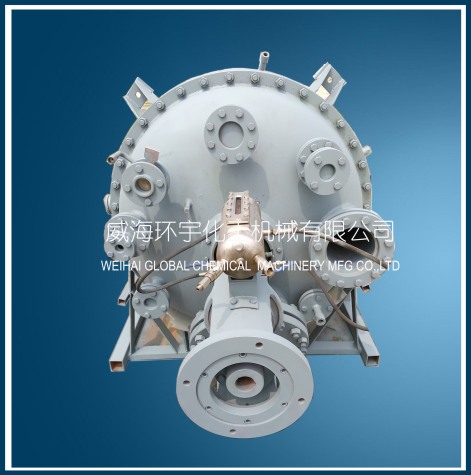Welcome Weihai Global Chemiacl Machinery MFG Co., Ltd.!

Service Hotline
0631-5766828
Advanced Search:
CONTACT USContact Us
HOTLINE:0631-5766828
(7x24)
Mob:13061173293
Fax:0631-5766838
Tel:0631-5766938
Address:No.2, South No.1 Road, YangTing Village, HuanCui District
500L~30000L Reactor

Name:Mechanical Reactor
Details
Machine seals, the full name of mechanical seals, in the industry is commonly known as machine seals. It is a device used to solve the sealing problem between the rotating shaft and the body. A device for preventing fluid leakage is composed of at least one pair of ends perpendicular to the rotating axis, which are kept together under the action of fluid pressure and elastic force (or magnetic force) of the compensating mechanism and the cooperation of auxiliary seals. It is often used in rotary fluid machinery such as pumps, compressors, reaction stirring kettles, as well as gearboxes, valves, rotary joints, ship tail shafts and other seals. Therefore, mechanical seal is a universal shaft packaging device.Seal structure:
The structure of the seal is various, and the commonly used structure generally includes the following components:
1. Locking device (locking screw) 2. Locking ring 3. Elastic element (spring) 4. Driving mechanism (transmission sleeve) 5. Compensating ring 6. Friction pair 7 auxiliary seal (O ring) 8. Non-compensating ring
1. Compensation Ring and Non-compensation Ring: Compensation Ring is a sealing ring with axial compensation ability, it can be a rotating ring (moving ring) or a non-rotating ring (static ring); non-compensation ring is a sealing ring without axial compensation ability, it can also be a rotating ring (moving ring) or a non-rotating ring (static ring).
2. Friction pair: There is a pair of sealing faces embedded at the top of compensation ring and non-compensation ring, which acts as the main sealing function of machine seal. In general, the compensation ring is made of soft material with narrow end face, while the non-compensation ring is made of hard material with wide end face.
3. Elastic elements and locking rings: they constitute loading, compensation and buffer mechanism to ensure that mechanical seals fit on the end face after installation; compensate in time when wearing; and play a buffer role in vibration and channeling. Elastic elements can be springs, bellows, springs, etc. Locking rings are used for the axial and radial positioning of elastic components. They usually have the functions of transmitting or overcoming the torque.
4. Auxiliary Seal Ring; It acts as an auxiliary seal. It can be divided into auxiliary seal of compensating ring and auxiliary seal of non-compensating ring. It can be O-rings, V-rings, wedge rings, rectangular rings and so on. It can be used to seal the seals between the shaft and the machine seal, the machine seal and the shell.
5. Driving mechanism: It plays the role of transmitting torque. Commonly used transmission modes are coiling of transmission sleeve, fork, pin, key or spring.
Seal classification:
There are many ways to classify seals.
According to the number of sealing end faces: divided into single end face and double end face (multi-end face)
Pressure unloading methods: divided into balanced and non-balanced
According to the number of elastic components: divided into large spring (single spring), small spring (multi-spring), leaf spring
According to the structural form, it can be divided into bulk type and bulk type.
According to the installation location, it can be divided into internal and external type.
According to the mode of motion, it can be divided into rotating and stationary modes.
According to the direction of medium leakage, it can be divided into inward and outflow modes.
According to the application equipment, it can be divided into water pump, chemical pump, slurry pump, kettle and so on.
Seal selection:
First, according to the magnitude of pressure, the balance structure and the balance degree can be initially determined.
When medium viscosity is high, lubrication performance is good, pressure is less than 0.8 MPa; or low viscosity, lubrication is poor, pressure is less than 0.5 MPa, non-equilibrium structure is generally chosen; when pressure exceeds the above value, balanced structure is chosen; when pressure is more than 15 MPa, series multi-end seal is selected.
2. Determine whether the elastic element rotates with the axis according to the magnitude of the velocity value, i.e. the spring rotating structure or the spring stationary structure.
When the speed is less than 20-30m/s, the spring rotating structure is selected, and when the speed is higher, the unbalanced mass of the rotating parts easily causes strong vibration, so the spring stationary structure is selected.
Industrial Reactor, Batch Reactor, High Pressure Reactor, Jacketed Reactor, Steam Heating Reactor, Stainless Steel Reactor, Polymerizer, Mechanical Seal Reactor, Magnetic Seal Reactor, High Temperature High Pressure Reactor, Thermal Oil Reactor
 Address:Yujiakuang, Yangting Town, Huancui District, Weihai City, Shandong Province
Address:Yujiakuang, Yangting Town, Huancui District, Weihai City, Shandong Province  Tel:0631-5766828
Tel:0631-5766828 E-Mail:huanyu01@wh-huanyu.com Record No:
E-Mail:huanyu01@wh-huanyu.com Record No: About Us
About Us Product
Product Contact Us
Contact Us scan code
scan code